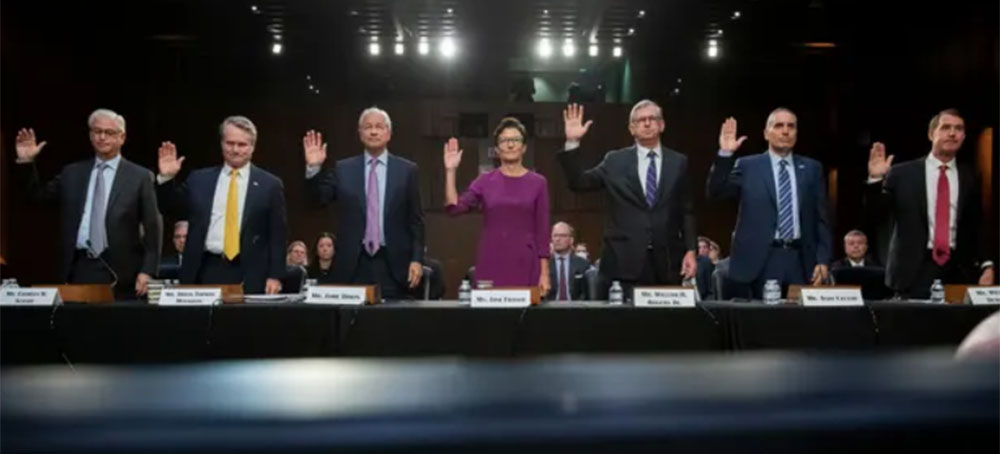Live on the homepage now!
Reader Supported News
When banks like Silicon Valley Bank collapse, money floods to bigger ones like JPMorgan. Clients know they’re ‘too big to fail’
But Becker won’t rake in the most from this mess. Jamie Dimon, chair and CEO of JPMorgan Chase, the biggest Wall Street bank, will probably make much more.
That’s because depositors in small- and medium-sized banks are now fleeing to the safety of JPMorgan and other giant banks that have been deemed “too big to fail” because the government bailed them out in 2008.
Last Friday afternoon, the deputy treasury secretary, Wally Adeyemo, met with Dimon in New York and asked whether the failure of Silicon Valley Bank could spread to other banks. “There’s a potential,” Dimon responded.
Presumably, Dimon knew such contagion would mean vastly more business for JPMorgan. In a note to clients on Monday, bank analyst Mike Mayo wrote that JPMorgan is “battle-tested” in volatile markets and “epitomizes” how the largest US banks have shed risk since the 2008 financial crisis.
Recall that the 2008 financial crisis generated a gigantic shift of assets to the biggest Wall Street banks, with the result that JPMorgan and the other giants became far bigger. In the early 1990s, the five largest banks had accounted for only 12% of US bank deposits. After the crisis, they accounted for nearly half.
After this week, they’ll be even bigger.
Their giant size has already given them a huge but hidden effective federal subsidy estimated to be $83bn annually – a premium that investors and depositors willingly pay to these enormous banks, in the form of higher fees and lower returns, precisely because they’re considered too big to fail.
Some of this hidden federal subsidy goes into the pockets of bank executives. Last year alone, Dimon earned $34.5m.
Dimon was at the helm in 2008 when JPMorgan received $25bn from the federal government to help stem the financial crisis which had been brought on largely by the careless and fraudulent lending practices of JPMorgan and other big banks. Dimon earned $20m that year.
In March 2009 Barack Obama summoned Dimon and other top bank executives to the White House and warned them that “my administration is the only thing between you and the pitchforks”.
But the former president never publicly rebuked Dimon or the other big bankers. When asked about the generous pay Dimon and other Wall Street CEOs continued to rake in, Obama defended them as “very savvy businessmen” and said he didn’t “begrudge peoples’ success or wealth. That’s part of the free market system.”
What free market system? Taxpayers had just bailed out the banks, and the bank CEOs were still raking in fat paychecks. Yet 8.7 million Americans lost their jobs, causing the unemployment rate to soar to 10%. Total US household net worth dropped by $11.1tn. Housing prices dropped by a third nationwide from their 2006 peak, causing some 10 million people to lose their homes.
Rather than defend CEO paychecks, Obama might have demanded, as a condition of getting bailed out, that the banks help underwater homeowners on Main Street.
Another sensible proposal would have been to let bankruptcy judges restructure shaky home mortgages so that borrowers didn’t owe as much and could remain in their homes.
Yet the big banks, led by Dimon, opposed this. They thought they’d do better by squeezing as much possible out of distressed homeowners, and then collecting as much as they could on foreclosed homes.
In April 2008, Dimon and the banks succeeded: the Senate voted down a bill that would have allowed bankruptcy judges to modify mortgages to help distressed homeowners.
In the run-up to the 2020 election, Dimon warned against policies that Bernie Sanders and Alexandria Ocasio-Cortez were then advocating, including Medicare for All, paid sick leave and free public higher education. Dimon said they amounted to “socialism”.
“Socialism,” he wrote, “inevitably produces stagnation, corruption and often worse – such as authoritarian government officials who often have an increasing ability to interfere with both the economy and individual lives – which they frequently do to maintain power,” adding that socialism would be “a disaster for our country”.
Dimon also warned against “over-regulation” of banking, cautioning that in the next financial crisis, big institutions like JPMorgan won’t be able to provide the lending they did during the last crisis.
“When the next real downturn begins,” he wrote, “banks will be constrained – both psychologically and by new regulations – from lending freely into the marketplace, as many of us did in 2008 and 2009. New regulations mean that banks will have to maintain more liquidity going into a downturn, be prepared for the impacts of even tougher stress tests and hold more capital.”
But, as demonstrated again this past week, American capitalism needs strict guardrails. Otherwise, it is subject to periodic crises that summon bailouts.
The result is socialism for the rich while everyone else is subject to harsh penalties: bankers get bailed out and the biggest banks and bankers do even better. Yet average people who cannot pay their mortgages lose their homes.
Meanwhile, almost 30 million Americans still lack health insurance, most workers who lose their job aren’t eligible for unemployment insurance, most have no paid sick leave, child labor is on the rise and nearly 51m households can’t afford basic monthly expenses such as housing, food, childcare and transportation.
Is it any wonder that many Americans see the system as rigged against them? Is it surprising that some become susceptible to dangerous snake-oil peddled by power-hungry demagogues?
Follow us on facebook and twitter!
PO Box 2043 / Citrus Heights, CA 95611



No comments:
Post a Comment
Note: Only a member of this blog may post a comment.